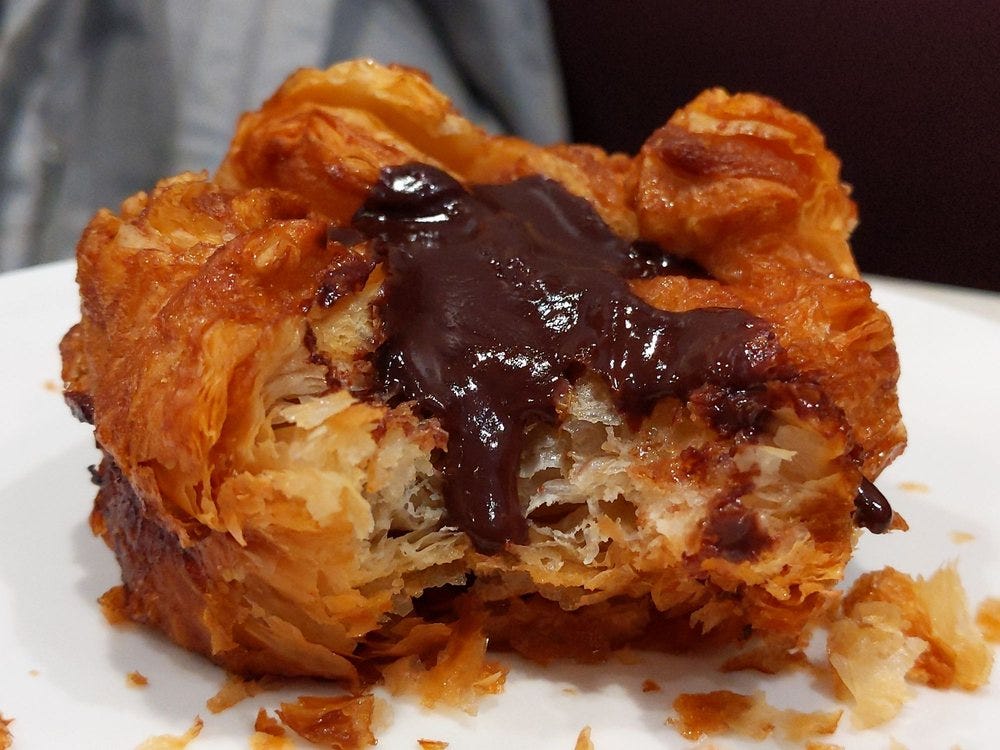Riding a Kouign-Amann to the Earth's Core
Can we help our children find the eating instincts we never had?
My husband showed me an extraordinary Tik-Tok the other day (Tik-Tok is a common noun, right?). Apparently the youths do a thing where they ask a question, and people Tik-Tok their responses (ok, also a verb?). This one was: What’s one thing you are teaching your kids that other people think is crazy? A middle-aged woman with cropped hair and a no-bullshit face responded, in the pithy Tik-Tok style (wait, it’s an adjective!) “I have three daughters, and I’m teaching them that there is no such thing as virginity.”
How about that?! The patriarchy invented a thing to shame and control and even, not-infrequently, murder women, and it never in a million years occurred to me that I could unlink that idea from my children’s psyches. Thanks, Tik-Tok (proper noun).
This year has been full of seemingly radical ideas that scramble my poor, culture-addled, parenting brain. For one, my white children are already racking up unearned privileges, at the expense of other children they don’t even know, and if I want to stop this, I’m going to have to fight hard. Also, everything we do comes with some amount of risk to weigh against its rewards, and this is not a truth specific to covid, but something that has always been true (see Emily Oster’s sobering statistics about car accidents).
But in the past few weeks, I’ve been contemplating another powerful, radical idea about how we think about parenting, one that might seem superficial but is wrapped up in a whole lot of deep, scary, molten-core-level shit for me. It is keeping me up at night, it is tugging up old roots in my ‘mind grapes’, and it’s making me question just what, exactly, I think I’m doing raising children. It is this: Put dessert on the table, every night, with dinner, and let your child eat it whenever they please.

A few years ago, I read Virginia Sole-Smith’s rad parenting memoir/sociological exposé, The Eating Instinct. Virginia explores our culture’s fucked-up relationship with food, the myriad ways people have been taught to divorce themselves from what they want to eat and when, and her Herculean efforts to cast all of this off when she becomes the mother of a child who wont eat a thing. The book is full of radical ideas, and unbelievable-yet-familiar stories of people with traumatic food and body histories trying everything they can other than connecting with their own eating instincts. Disordered eating comes in all shapes and sizes, and walking around our world with it is like being abused, and then living, working, and socializing with your abuser.
It’s also full of practical, though again radical, suggestions on how to not let history repeat itself with your own children, many of which come from Ellyn Satter’s “Division-of-Responsibility” method, wherein your child gets to control whether and how much they eat, and you provide the what (including putting dessert on the table, with dinner, every night), where, and when. This idea, which I’ve been toying with for years, and which, as a psychologist, I would enthusiastically recommend to other parents, is so damn difficult for me to sit with. And I know exactly why.
On Valentine’s Day, 2015, I sat alone at a table at B Patisserie in San Francisco, slowly eating a chocolate Kouign-Amann and crying. This sounds like a cheesy break-up scene: Man leaves woman, woman eats her feelings. But, in fact, it was more of a romantic climax. I had been working hard on my disordered eating for over a year. My latest attempt to starve myself, presented to the public as “the paleo diet,” (nothing but love for people who do this for healthy reasons, but a lot of people like me find a socially acceptable and even encouraged home in things like this), had failed. I lost weight, then gained it all back, and then some, and with it, all my food demons returned. I had thought I was done beating myself up about how I looked and ate, but as it turned out, I was just skinny. I attended session after session of the kind of therapy that requires a nap afterwards, trying to wrest all my fucked-up ideas about food from my brain like a slow, expensive, exorcism.
One day, as I sat in my therapist’s living room/office, she asked if I would list all of my rules about food. I wasn’t quite sure what she meant at first, but when I got going it became obvious. No sugar in the day time. Fat-free dairy only. No oil in salad dressings. You can’t order dessert unless someone else does. No big breakfasts unless you are at a restaurant or on vacation. No bread in the house. No sweets in the house. Unlimited everything on holidays, followed by deep shame. When I was finished, she called her eleven-year-old daughter into the room, gathered her on her lap, and asked if I would repeat my list to her. I wouldn’t. And I didn’t have to. Her point was made.
I worked my way, slowly, towards connecting with my own eating instincts and even honoring them. When I passed a woman who was skinnier than me on the street, I repeated my therapist’s mantra, “I have no idea about other people’s pain” to replace my thoughts about how much better life would be if I were her. I watched my therapist happily unwrap and eat a piece of chocolate at 9 a.m. in front of me, and though I did not join her, I realized that if she hadn’t burst in flames, I probably wouldn’t either.
And, on Valentine’s Day, a day where men buy woman chocolates they feel guilty about eating, and lingerie they feel obliged to wear, I returned to a cafe where I had once ordered a non-fat latte and where I had longed for one of their buttery, chocolatey pastries but couldn’t think of a rule that would allow me to have one. I gathered up my courage, thousands of dollars of hard psychological work behind me, and ordered it. Then I sat down at a little table and did a completely terrifying thing: I enjoyed myself.
Unlike some of my girlfriends, I wasn’t raised with a mother who put me on diets. My parents commented little on my body, and no one stayed at the table until midnight because they wouldn’t eat all of their peas. But it was there, all around me. In my home, of course, as it is in almost every American home, seeping through the cracks in an offhand comment between adults or the subtle ways others relate to eating, which children, of course, are always picking up on. And it was out there - I don’t need to tell you where because you’ve seen it and felt it. It was enough to tangle me up in its web.
I remember watching the movie “Eating,” an independent film featuring an all-female cast (but interestingly, written and directed by a man), as a young girl. There is a birthday party scene, where cake is served. The plates are passed around, and every single women comes up with an excuse not to take one. The only people who eat a slice are the grandmother and the teenaged girl, who, if memory serves me, throws it up afterwards. The scene was meant as social commentary, to critique the choices made by all of the women who deprived themselves (and perhaps to blame them for being in that situation at all). But as I watched it, all I could think of was how great it would be to have that kind of willpower. I knew, already, that I would join the ranks of these fictionalized women. I couldn’t wait.
As you know if you’ve read my rantings before, I think our generation of parents mostly overthinks and overdoes things, but Ellyn Satter does not, thank the good lord, insist that you slave away in the kitchen all day roasting organic vegetables or Jessica-Seinfeld-ing (verb) spinach into brownies. One of my favorite quotes from Satter’s website is, ”Pizza makes a fine meal, so do chicken nuggets and canned peaches just arrange to have them ready at meal-time and all sit down together to share them.”
Satter does, however, have a lot to say about restricting “forbidden foods” (I think Kouign-Amanns would fall comfortably into this category). In addition to the nightly dessert, eaten in any order with dinner, she recommends serving fatty foods like chips and fries with dinner, and suggests that soda be a regular though infrequent option. Virginia Sole-Smith not only offers dessert with dinner, but has a weekly ice cream night where the servings are, jeepers, unlimited! These things, not snuck shamefully or slid in as part of a social event or vacation, but done in plain sight, with intention, make me so uncomfortable I want to scream.
But the proof is in the not-just-allowed-on-special-occassions-pudding. As a dietician explains to Sole-Smith in this piece, “Eating disorders have many underlying causes, but we know a history of dieting increases risk. Teaching children to listen to their bodies rather than restricting portions is a crucial way to avoid that.”
My friend recently posted, on this topic, that she treats her children, at meal times, like colleagues at a work lunch. She will ask if they are enjoying their meals, but beyond that, she wont comment on what or how they are eating. I am trying, failing, trying again. I have done some of the things but cannot yet bring myself to do others. I have no interest in tracking bites, telling my children they did a “good job” eating, or engaging in endless negotiations about when some arbitrary quota has been met and candy can be had. But I still do them. It is very hard not to. We have started to serve everyone dinner together, putting some tried and true foods (like rice and pasta) on the table as well as some “maybes.” Watching my children, along with the usual dinner-time antics, do things like serve themselves, try new foods, and participate more in the prep and table-setting, is nothing short of revelatory. And I try to be conscious of what I say and do with my own body and eating, but also at times tell my kids “listen to your body!” and then joylessly toss back a bag of peanut M & M’s when no one is looking.
This journey, of continuing to search for our own instincts, of shedding very ingrained habits at a speed fast enough to keep up with our constantly growing offspring, can feel like a burden, like a prophecy unable to be broken. But it can also feel like a calling. Like a second chance. Like biting into a gooey, decadent-but-not-indulgent (what is indulgence anyway but the other side of deprivation?) confection and saying “Look. I can do this, too.” As Stanley Tucci might ask, what if we could believe in such a radically different idea, which is only radical because we never thought anything other than what we knew was possible? Surely it can’t be harder than drilling into the earth’s core.
More?
-Subscribe to Virginia Sole-Smith’s newsletter, Burnt Toast.
-Check out Division-of-Responsibility feeding stuff here.
-How do you deal with kids and food? I love your comments! Leave one below!









Radical: My two brothers and I were raised on a no-rules food system: We had access to as much candy as we wanted - all day long... including ice cream and cookies. My father kept the supply almost full almost all of the time in a dining room drawer.
Mealtimes: breakfast was almost always pancakes or French toast and bacon and LOTS of maple syrup. Lunch: was always a simple sandwich with milk - since we didn't like milk but, during the 40's and 50's it was considered essential to have at every meal, our milk was always enhanced with either Bosco or Hershey's chocolate syrup. Dinner: mostly chicken, or steak and canned vegetables...although we were often given the option of Franco-American spaghetti - in a can.
None of the three of us has ever had a weight problem and we all have grown up really thoughtful and conscious of eating a basically very healthy diet. We are relaxed about food...not neurotic. There was one rule: as we left the dinner table we had to compliment my mother on her cooking or some aspect of the meal. (I was very popular - my candy-deprived friends would visit regularly!)
It is important to me to teach my daughter healthy eating and living habits. I am grateful that my parents taught them to me. Eat slowly, enjoy your food, drink water, take time to talk, and listen, at the table, listen to your body and what it wants. Try to move your body every day. Enjoy vegetable and fruits and also desert, but really enjoy it. See dessert as a privilege to be savored and not a right. I try to present good food and to model healthy habits for her. We like to cook and have always fed her what we eat and I think this has made her more of an adventurous eater. We also live in a city that is filled with food from all over the world and we enjoy it together. She is more adventurous than I am, truthfully. I do think many children learn to eat mindlessly and like it's a speed-oriented sport, and I am trying to help her learn different habits. I will say that she and her friends seem to have much better body images than I did at their age (12). She goes to a progressive girls school that has focused on rejecting/reimagining the thinking about body ideals that we grew up with and I think this has helped a lot. It's kind of amazing to see this. Relatedly, there is a great book called First Bite: How We Learn to Eat, that you might enjoy. I thought it was great.